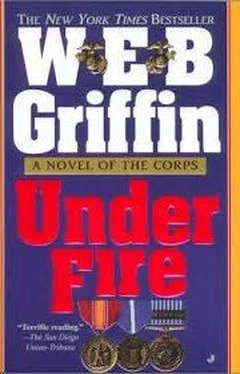Griffin W.E.B. - The Corps 09 - Under Fire
Здесь есть возможность читать онлайн «Griffin W.E.B. - The Corps 09 - Under Fire» весь текст электронной книги совершенно бесплатно (целиком полную версию без сокращений). В некоторых случаях можно слушать аудио, скачать через торрент в формате fb2 и присутствует краткое содержание. Год выпуска: 0101, Жанр: Старинная литература, на английском языке. Описание произведения, (предисловие) а так же отзывы посетителей доступны на портале библиотеки ЛибКат.
- Название:The Corps 09 - Under Fire
- Автор:
- Жанр:
- Год:0101
- ISBN:нет данных
- Рейтинг книги:5 / 5. Голосов: 1
-
Избранное:Добавить в избранное
- Отзывы:
-
Ваша оценка:
- 100
- 1
- 2
- 3
- 4
- 5
The Corps 09 - Under Fire: краткое содержание, описание и аннотация
Предлагаем к чтению аннотацию, описание, краткое содержание или предисловие (зависит от того, что написал сам автор книги «The Corps 09 - Under Fire»). Если вы не нашли необходимую информацию о книге — напишите в комментариях, мы постараемся отыскать её.
The Corps 09 - Under Fire — читать онлайн бесплатно полную книгу (весь текст) целиком
Ниже представлен текст книги, разбитый по страницам. Система сохранения места последней прочитанной страницы, позволяет с удобством читать онлайн бесплатно книгу «The Corps 09 - Under Fire», без необходимости каждый раз заново искать на чём Вы остановились. Поставьте закладку, и сможете в любой момент перейти на страницу, на которой закончили чтение.
Интервал:
Закладка:
Pick laughed and waved his father ahead of him toward
the door in the terminal marked customs air crews only.
Trans-Global's Tokyo station chief was waiting for them outside customs. Pickering didn't know him, but the man obviously knew who he was.
I suppose, as MacArthur is El Supremo of Japan, I am El Supremo of Pacific and Far East. But what does this guy think I'm going to do to him? Eat him alive?
"I'm Fleming Pickering," he said, offering his hand with a smile.
"Yes, sir, I know. Welcome to Tokyo. How was your
flight, sir?"
"Very nice," Pickering said. "Did you get the word about how little time it took us?"
"Yes, sir," the man said. "And we should have official confirmation within the hour." He turned to Pick. "Con-gratulations, Captain."
"Let's hold off on that until we get confirmation," Pick said. "But thanks anyway."
"Captain, Mr. Ansley asks that you come to base opera-tions. Apparently, there's some paperwork connected with certification...."
"I figured there would be," Pick said. "Dad, there's no reason why you have to wait around here for God knows how long." He turned to the station chief. "We have wheels to take my father to the hotel, right?"
"Right outside," the station chief confirmed.
"I'll see you at the hotel," Pick said.
The wheels turned out to be a 1941 Cadillac limousine. Pickering wasn't pleased with that, but realized that saying anything to the station chief would make him sound un-grateful.
"Charley Ansley's told me what a fine job you've been doing here," Pickering said, offering his hand to the station chief.
That wasn't exactly true. It was an inference: If this fel-low wasn't doing a hell of a good job, Charley Ansley would have canned him long ago.
"That's very kind of Mr. Ansley, sir," the station chief- whose name had never come up-replied, almost blushing with pleasure.
Pickering got into the backseat of the limousine. The station chief waited at the curb until the limousine was out of sight.
This is not the first time I've been driven from an airfield into Tokyo in a limousine. The circumstances were different the last time. The last time, Japanese soldiers and police and ordinary civilians lined the streets, bowing their heads toward the cars of their American conquerors.
I was involved in that goddamn war, literally from the first shots until the last act.
But that was a long time ago. General, and incidentally, General, you're not a general anymore.
On December 7,1941, wakened by the sound of low-flying aircraft, Fleming Pickering had gotten out of his bed in the penthouse suite of the Foster Waikiki Beach Hotel in Hon-olulu and watched the Japanese attack on the Navy base at Pearl Harbor.
He had been enraged, not only at the Japanese sneak at-tack, but also at what he perceived to be the nearly criminal incompetence of the senior military-especially the senior Naval-officers in Hawaii, who he felt had been derelict in allowing such an attack to happen.
He had sailed that night to Seattle, Washington, aboard the Pacific Princess, the flagship of the Pacific and Far East fleet, which had been commandeered by the U.S. Navy and was to be converted to a troop transport. Its speed, it was theorized-and later proven-would make it immune to Japanese submarine attack.
Once in the United States, Pickering had immediately gone to Washington to volunteer for service as a Marine again. Brigadier General D. G. Mclnerney, USMC, with whom he had served-both of them sergeants-at Belleau Wood in France in the First World War, more or less gently told him there was no place in the Marine Corps for him, and that he could make a greater contribution to the war ef-fort by running Pacific and Far East.
It was the second time he had been, so to speak, rejected for government service.
Before the war had involved the United States-but when he had known that war was inevitable-he had been offered "a suitable position" in the "Office of the Coordina-tor of Information," later renamed the Office of Strategic Services. Swallowing his intense dislike of the Coordinator of Information himself, Colonel William "Wild Bill" Dono-van, he had gone to Washington for an interview and found that what Donovan had in mind was a bureaucratic post un-der a man for whom Pickering had a profound disgust.
Forced to admit that Mac Mclnerney was right-he was not qualified to be a Marine captain, much less a Marine colonel, which is what he had more than a little egotisti-cally had in mind-Pickering had gone from Mclnerney's Eighth and "I" Streets office to the Foster Lafayette Hotel, across from the White House, where he was staying in the apartment of his close friend, Senator Richardson K. Fowler (R., Cal.). Once there, nursing his rejection, he had promptly crawled most of the way into a quart bottle of the senator's Famous Grouse.
When Secretary of the Navy Frank Knox had appeared unannounced in the apartment to see Senator Fowler, Pick-ering had lost little time in sharing with the Secretary his opinion that "the Pearl Harbor admirals" should be court-martialed and that Knox himself should resign. Almost as an afterthought, he told Knox that he would fight the Navy's intention of commandeering the entire Pacific and Far East fleet-they could have the Pacific Princess and the other passenger ships, but that's all-all the way to the Supreme Court.
The next day, nursing a monumental hangover as he flew back to San Francisco, he was convinced that his drunken attack on Knox-for that's unquestionably what it had been-had ended once and for all any chance of his ever again serving in uniform.
He was wrong. A few days later, Helen Florian, his sec-retary, had put her head in his office and announced that Secretary of the Navy Frank Knox was in her office and wanted to see him.
Pickering was convinced that it was payback time for their encounter in Senator Fowler's apartment. Knox was almost certainly going to tell him, with justified relish, that the U.S. Navy was commandeering every vessel in the PandFE fleet and the PandFE building, "for the duration," and that he was to be out of the building by five o'clock.
But that wasn't what Knox had had in mind at all.
Knox said that he suspected-human nature being what it was-that the reports he was getting-and would be get-ting-from the admirals in the Pacific-men with a life-long devotion to the Navy-would understandably paint
the situation to the advantage of the Navy, rather than as what it actually was.
What he had to have, Knox said, was a cold, expert ap-praisal of what was going on out there from someone who knew ships, and shipyards, and the Pacific, and wasn't cowed by thick rows of gold braid on admirals' sleeves.
Someone, for example, who had spent his lifetime in-volved with the Pacific Ocean; someone so unawed by rank and titles that he had told the Secretary of the Navy he should resign.
Within days, a hastily commissioned Captain Fleming S. Pickering, U.S. Navy Reserve, boarded a Navy plane for Hawaii, his orders identifying him as the Personal Repre-sentative of the Secretary of the Navy.
Pleased with the reports Pickering had furnished from Pearl Harbor, Knox ordered him to Australia to evaluate the harbors, shipyards, and other facilities there. He arrived shortly before General Douglas MacArthur did, having es-caped-at President Roosevelt's direct order-from the Philippines to set up his headquarters in Australia.
Pickering became an unofficial member of MacArthur's staff, but by the time of the First Marine Division's inva-sion of Guadalcanal, was convinced that his usefulness was pretty much at an end.
Aware-and not caring-that Knox would certainly be annoyed and probably would be furious, Pickering went ashore on Guadalcanal with the Marines. He offered his serv-ices to the First Marine Division commander, Major General A. A. Vandegrift, in any capacity where Vandegrift thought he might be useful, down to rifleman in a line company.
Читать дальшеИнтервал:
Закладка:
Похожие книги на «The Corps 09 - Under Fire»
Представляем Вашему вниманию похожие книги на «The Corps 09 - Under Fire» списком для выбора. Мы отобрали схожую по названию и смыслу литературу в надежде предоставить читателям больше вариантов отыскать новые, интересные, ещё непрочитанные произведения.
Обсуждение, отзывы о книге «The Corps 09 - Under Fire» и просто собственные мнения читателей. Оставьте ваши комментарии, напишите, что Вы думаете о произведении, его смысле или главных героях. Укажите что конкретно понравилось, а что нет, и почему Вы так считаете.










